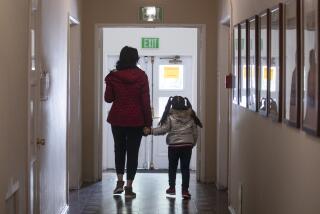Campus Correspondence : Finding a ‘Safe Place’ on Campus for Student Victims of Domestic Violence
EAST LANSING, MICH. — When darkness begins to envelop Michigan State University, students, especially women, are advised not to walk alone. In an attempt to deter criminals and increase safety, police patrol the grounds on foot, extra lights illuminate sidewalks winding between trees and ivy-covered buildings and more telephones are available for emergency calls.
But once students arrive safely in their dormitories, apartments or houses, no one can protect them from a silence shattered by shouts, tears and fists.
MSU Safe Place, one of the first on-campus shelters in the country, offers hope for faculty, staff and students who are victims of domestic violence. It provides a place to sleep, clothing, cooking facilities and day-to-day equipment that abuse victims need. Victims are welcome to stay for five days, then may be referred to other housing.
Safe Place was the brainchild of MSU President M. Peter McPherson’s wife, Joanne, who has long been interested in the issue of domestic violence. The next phase of the project is to let women know the shelter exists and, at the same time, keep the location a secret. Currently, women must be referred to the shelter either by campus police or by an outside counselor on domestic abuse.
When Safe Place was first established this summer, cynics questioned the need for a shelter that helped women and men who are mostly young and single. But campus police never doubted the need. They believe domestic violence represented 15% of the 181 assaults reported on campus last year. Before Safe Place, victims at MSU had one shelter to go to--the only one in the county. And it had to turn away about 200 people last year.
No one wants to believe that the shrill voices and crashes next door amount to more than an isolated argument. No one wants to accept that one of three women murdered in the United States is killed by a husband or boyfriend. No mother, father, sister, brother or friend wants to face up to these numbers:
Between 25% and 50% of women involved in intimate relationships with men will be physically abused at least once. An average of 28% of high school and college students are assaulted by someone they are dating, potentially the most accurate indicator of future abuse.
Still, domestic abuse is an unmentionable. Statistics, even the most hard-hitting ones, are alienating. It took the violent death of a former wife of a superstar athlete to bring an old issue to the forefront of the country’s attention.
But who else has to die before serious remedies and punishments are proposed? I refuse to be grateful that Nicole Brown Simpson had to be martyred for the sake of public awareness, when an untold amount of people suffer from abuse every year, with many dying as a result of their injuries. Must a person die or be killed for every law, every restraining order, every piece of support, every shelter, every prosecution?
Perhaps, that is already happening.
It will take so much more than faceless numbers and media preaching and intermittent cater-to-public lawmaking. Individual efforts are commendable, and volunteers can make small differences, but domestic violence is a monster.
Dismantling stereotypes and fostering awareness is the beginning. Educating students and abusers, potential and actual, as Safe Place will do, is another step.
Most important, victims need to realize that domestic abuse is wrong. True, it is taken more seriously today than before, but that is not a drastic improvement. Thirty years ago, spousal abuse was not specifically outlawed. The public perception of domestic violence and its victims needs to shift responsibility away from the abused and onto the abusers.
Battling violence with shelters, education and support for people of every race, age and gender will help unlock the confines of abusive homes and preserve safety, self-respect and dignity.
More to Read
Sign up for Essential California
The most important California stories and recommendations in your inbox every morning.
You may occasionally receive promotional content from the Los Angeles Times.










